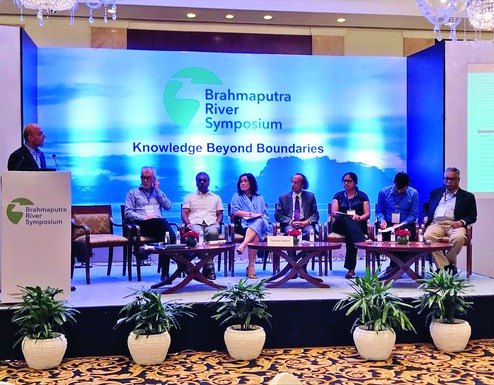
Participants in the symposium in New Delhi. Telegraph picture
Guwahati, Sept. 28: A multi-stakeholder meeting on the Brahmaputra organised by IIT Guwahati on Monday and Tuesday stressed knowledge sharing and collective efforts to strengthen the science-policy interface.
The Brahmaputra River Symposium 2017: A Multi-Stakeholder Meet on Knowledge Sharing was organised by IIT Guwahati, TERI, New Delhi, and Hyderabad-based South Asia Consortium for Interdisciplinary Water Resources Studies (SaciWATER), a policy research institute, in New Delhi.
The symposium was attended by experts across different sectors from the basins (Bangladesh, Bhutan, China, and India) as well as international river basins (Mekong, Murray-Darling, Nile, Rhine and Yangtze).
Representatives from the Union ministry of water resources, river development and Ganga rejuvenation and the ministry of environment, forest and climate change were also present.
The director of IIT Guwahati, Gautam Biswas, said: 'We are struggling with sustainable management of the river. Such platforms like the Brahmaputra river symposium will lead to an exchange of experiences, addressing the knowledge gaps and development challenges in the basin.'
Former foreign secretary Shyam Saran said: 'A river cannot be divided, cut and quartered, it is an integrated ecosystem. If each country tries to maximise its own benefits from the river, in the end all will lose.'
Addressing the participants, Anamika Barua from IIT Guwahati said building trust is important across sectors, and across and within countries.
Barua also highlighted key challenges in the basin, speaking of the importance of the three 'I's - inform, investment and institution.
The National Environment Commission from Bhutan stressed that water availability is high but accessibility is low in the country. Ainun Nishat from Bangladesh said: 'Common basin management for common rivers between Bangladesh and India, and strengthening institutions like the joint river commission is crucial.'
The former secretary of water resources, Assam, A.K. Mitra, said: 'The Brahmaputra is a complex river and floods/flash floods and erosions are major challenges for Assam. It is important to understand the river morphology and implement an integrated water management approach.'
Best practices from the Mekong, Murray-Darling, Rhine and Yangtze basins were presented by experts from these regions. In Mekong, data collection and scientific knowledge building have been the most successful way of bridging cooperation among the basin countries.
Civil society organisations have played a crucial role in the improved management of the Rhine river. Other international experts on trans-boundary rivers provided valuable inputs.
Over two days, the participants mapped the knowledge landscape by identifying the current challenges and opportunities across the Brahmaputra basin on the impact of floods, erosion, wetlands, gender and social inequity in access to resources, vulnerabilities associated with migration in emergence and re-emergences of riverine islands called sars.
A statement issued by IIT Guwahati said that key action points identified were consolidating knowledge base, multi-stakeholder involvement with emphasis on engaging media, civil society organisations and communities, flood early warning systems, open access community database, joint research studies, gender mainstreaming, among others.
It was emphasised, in the concluding remarks, to reach a common ground on an agreed agenda among the stakeholders through a science-policy interface and dialogues at regular intervals.










